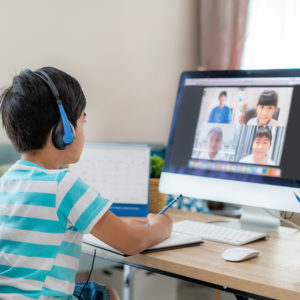As Delaware Valley students prepare to hit the books, parents are dealing with stress and confusion as the 2020-2021 school year begins virtually.
Christine Stigall is a mother of three in the Downingtown Area School District. The earliest date students may return to in-person classes there is November 5, the end of the first marking period. “Lots of tears, a lot of frustration,” she said describing the virtual start, “because we don’t even have that choice of hybrid or in-person.”
“I was hoping the kids would be in school with precautions,” said Brandon McLean, a parent of four in the DASD. “Just to go full online… it makes it feel like you almost need a third parent in the house.”
Despite the steep decline in COVID-19 cases since last spring, Delaware Valley school districts have mostly moved to virtual learning due to fear of outbreaks that have been seen across the south and on college campuses. Only one school in the region is returning to all in-person classes.
Deborah Singer Livingston, parent of three students in the Lower Merion School District, said that virtual “is definitely the safest option at the moment.” When asked when she would feel comfortable having her kids return to school, she didn’t have an answer.
Stigall said while she didn’t believe in living in fear, she understands why DASD officials felt it was unsafe to return to school. “I do to an extent, but I think it’s disingenuous to not also acknowledge that our students are the ones who are least at risk.” She added that if the problem was the safety of the teachers, it was the district’s responsibility to supply them with the necessary equipment.
Helene Conroy-Smith believes virtual learning is the right option for now. But she says she doesn’t believe Havertown Township School District, where she had two children enrolled, is prepared to run it.
This is not a new concern for Conroy-Smith.
“I gave my school district three weeks” to figure out how to teach virtually in the spring, she said. “For my older daughter, I supplemented her. For my fourth grader, I totally supported her and realized this wasn’t going to work.” Therefore, in April, Conroy-Smith moved her youngest child into a cyber charter school, where she felt confident they were prepared to teach virtually.
The spring’s experience though has provided lessons to school districts, and most parents feel that the fall semester has potential to be better.
“It’s definitely better than the spring, specifically because they’ve added the synchronous learning with the zoom calls with the teacher. So, they do have face-to-face time,” said McLean.
“I think it’s more structured than it was in the spring,” said Stigall, but she believes that the technology aspect remains a problem. “I don’t see a lot of cohesiveness… There’s a lot of frustration on the technology end, a lot of glitches happening. There could have been some more troubleshooting.”
It’s why Conroy-Smith is keeping her youngest daughter out of HTSD for the fall. “The high school principal told me the teachers have received ten hours of training on virtual learning. As a special educator in another district, I know that ten hours is not enough.”
HTSD Director of Curriculum and Instruction Jennifer L. Saska pushed back in a statement to Delaware Valley Journal. “Since March 13, our staff have engaged in a total of 38 hours of professional development to support teaching in the virtual environment.” They added, “Our teachers will engage in these learning practices as they continue to refine their strategies and techniques for teaching and learning in the virtual environment.”
Virtual learning has upended the lives of students. Conroy-Smith said her daughter came to her in the spring and said, “‘Mom, I’m not learning,’ and as she’s entering into her senior year she said, ‘I’m concerned that I’m not going to be ready for college.’”
The move to online schooling has also changed parent’s lives. While Stigall is able to stay at home, she’s disappointed because she “was getting ready to start heading back into the workforce… so I’m stopping with that process for now.”
McLean spends a chunk of his time now helping his kids with the technology aspect. “My wife works halftime so we can shift it out, but it is definitely a time suck.”
Despite the problems, McLean is keeping his kids in DASD out of hope that “cooler heads will prevail,” he says, and classes will eventually return in-person.
Livingston expressed hope teachers could make the system work. “I’m putting a lot of trust in our wonderful teachers… trust in their abilities to keep our children learning.”
But no matter what, concerns remain, and Conroy-Smith expressed her sentiments about the situation in a simple fashion: “It’s not acceptable what’s happening to our children today. It’s just not acceptable.”

